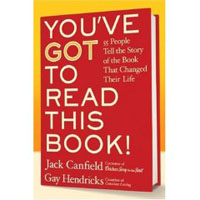Vagabonding and You’ve Got to Read This Book!

I was pleased to learn recently that Vagabonding is included among the influential books mentioned in the newly released You’ve GOT to Read This Book!: 55 People Tell the Story of the Book That Changed Their Life.
Edited by Chicken Soup for the Soul guru Jack Canfield, You’ve Got to Read This Book! explores the potential books have to change people’s lives. In the collection, humorist Dave Barry writes about Robert Benchley’s Inside Benchley; actress Catherine Oxenberg writes about Bryce Courtenay’s The Power of One; craigslist’s Craig Newmark writes about The Cluetrain Manifesto; activist Doris “Granny D” Haddock writes about Peace Pilgrim; musician Kenny Loggins writes about Herman Hesse’s Siddhartha; congresswoman Lois Capps writes about Jeffrey Sachs’s The End of Povery.
Vagabonding gets a nod from accelerated-learning researcher and linguist Tim Ferriss, who (in addition to writing about language for this blog) holds national titles in Chinese kickboxing, is the first American to hold a Guinness world record in tango, and has worked with more than 80 world-champion athletes as director of research at BrainQUICKEN LLC Research and Technologies.
For Tim, who came to helm a successful business at a very young age — but had no time to enjoy this life — Vagabonding provided perspective on the need to balance work with one’s deeper dreams:
…I found a book that made me look at my life, work, and goals in an entirely new way—Vagabonding: An Uncommon Guide to the Art of Long-Term World Travel, by Rolf Potts. …His idea that you don’t have to wait for retirement to start doing what you’ve always dreamed just made sense. I’d finally found another person who thought the way I did.
But more than that, Vagabonding presents a philosophy about travel which Potts says isn’t about escaping ordinary life for a period of time but about discovering your life. It’s a lifestyle choice that may require a major shift in one’s priorities. I found Potts’s concept of voluntary poverty and simplification very interesting. It made me realize how much stuff I had accumulated that I just didn’t need—so many things I had were just taking up space on my “mental plate.” I ended up going through all of my earthly belongings and getting rid of 80% of them. As soon as I did that, it became easier to prioritize everything I did and enjoy everything I had. This process of simplifying my life was exhilarating— but was still only a warm-up for the big experiment.
In 2003, taking only a small backpack—with Potts’s book in it—I bought a one-way ticket to Europe and left with no timetable for my return and no clear itinerary beyond my first stop: a friend’s apartment in London. …Removing myself from my deeply engrained work habit forced me to take a long look at my values and priorities. Although I’d always worked, I’d never stopped to ask myself what I was working for: How much money did I need? What was I trying to accomplish? With this new opportunity to reflect on these questions, it became clear that (1) I hadn’t defined my goals clearly, (2) I often worked out of guilt—so I wouldn’t appear “unproductive” to others, and (3) I had actually become overly regimented and fearful of the unknown. My habits, designed to help me succeed by brute force, were killing me spiritually and emotionally.
Over the course of the trip, living life as a vagabond helped me to tackle all these issues and jump directly into self-knowledge and self-development without the distraction of working for work’s sake. At first, I acted the part of tourist because I didn’t know what else to do—visiting museums, parks, landmarks—but it got boring quickly. Everything changed when I shifted from “seeing” things—simply logging away memories—to doing things and learning things. By the time I left London, the trip had taken on a life of its own. I had figured I’d be gone for 8 weeks, but I ended up visiting 16 countries over the course of almost 18 months.
The trip was a rediscovery process—working the way I had up until then, I’d let nearly all of my passions and interests atrophy. Traveling, I was able to revive old interests and create new ones: I trained with champion fighters in Oslo, learned to tango in Argentina, and snorkeled in Panama. What enabled me to do all of this was applying the principles in Vagabonding.
More information about You’ve Got to Read This Book! can be found here or here.
As for Tim Ferriss, he and his Argentine dancing partner recently broke a world record in tango spins on Live With Regis and Kelly. Video clip online here.

Category: Travel Writing